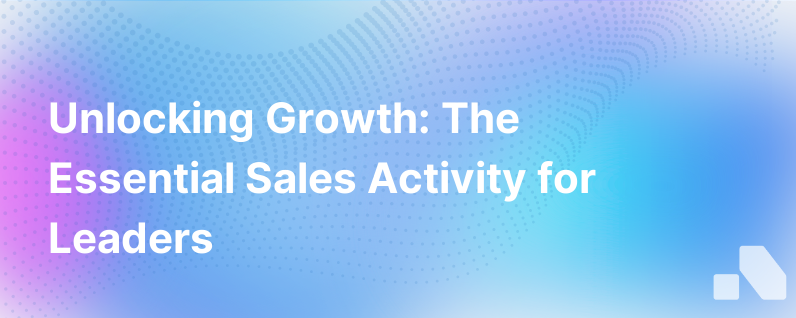
In the pursuit of growth, B2B organizations are often inundated with myriad strategies and metrics. Amongst these, the pivotal role of sales activity, particularly customer engagement, stands out as the linchpin of sustained success. This article explores the unparalleled significance of customer engagement as the sales activity that matters most to the growth of an enterprise.
Understanding Customer Engagement in Sales
Customer engagement represents the interactions that transpire between your company and your customers, encompassing every touchpoint from initial contact through the entire lifecycle of the relationship. Why is this engagement so critical to growth?
- Fosters Trust and Relationship Building: Engaged customers build a trusting relationship with your brand, laying the foundation for loyalty and long-term commitment.
- Increases Customer Retention: High levels of engagement contribute to customers sticking with your product or service, thus lowering churn rates.
- Drives Revenue Expansion: Engaged customers are more likely to make repeat purchases and are often open to upselling or cross-selling opportunities.
- Amplifies Brand Advocacy: Customers who regularly engage with your brand are more likely to become advocates, providing organic, valuable promotion.
- Enhances Product Development: Engagement facilitates feedback which can be channelled into product development, ensuring your offerings remain competitive and relevant.
- Improves Resilience to Competition: A strong relationship with customers creates a buffer against competitor advances, protecting your market share.
Clearly, customer engagement is not a one-dimensional activity. It's complex, calling for a strategic approach that touches on various facets of a business.
Sales Activities That Drive Customer Engagement
A host of specific sales activities can be linked directly to boosting customer engagement, with the potential to impact growth.
- Personalized Communication: Engage your customer by using their data to create personalized experiences. Show them that you understand and value their unique business challenges.
- Solution Selling: Rather than pushing your product, focus on problem-solving. Listen to their needs and adapt your solutions to address those needs appropriately.
- Social Selling: Utilize social networks to interact with potential and existing customers, adding value through meaningful content and conversations.
- Product Demos and Walkthroughs: Provide hands-on experiences where customers can see your product in action and envisage how it can solve their problems.
- Customer Onboarding: Ensure new customers have a smooth transition into using your product or service. A good onboarding experience sets the tone for the entire customer relationship.
- Customer Support: Responsive and proactive customer support is a pivotal touchpoint of engagement that can either strengthen trust or drive customers away.
- Regular Check-ins and Nurturing: Scheduled calls and emails to check on a customer’s progress can keep the lines of communication open and provide ongoing opportunities for engagement.
Each of these sales activities, when executed with a penchant for quality and customer-centricity, not only drives customer engagement but ultimately propels growth.
Measuring Engagement to Drive Growth
It's not enough to just ‘do’ the aforementioned activities. Companies must gauge the effectiveness of these engagements. Key performance indicators (KPIs) and sales metrics such as Net Promoter Score (NPS), Customer Satisfaction (CSAT), churn rates, customer lifetime value, repeat purchase rate, and upsell/cross-sell ratios provide insight into the health and profitability of customer relationships.
However, more than just measuring, you must decipher what these metrics indicate about your engagement efforts and how they tie back to growth objectives. Are customers who engage with you on social media more likely to make a purchase? Do customers with consistent check-ins show greater loyalty? The answers to such questions can help refine your strategies.
Cultivating a Culture That Values Engagement
For engagement to be more than just a buzzword, fostering an internal culture that values customer-centricity is imperative. This involves:
- Training: Your team must be adept at recognizing customer needs and skilled in communication.
- Empowerment: Give your team the autonomy they need to make decisions that benefit the customer.
- Recognition: Celebrate wins, big or small, acknowleding team efforts that drive high customer engagement.
- Leadership: Encourage leaders to exemplify the kind of engagement you expect, making it a part of your company DNA.
Nurturing Engagement with Technology
In today's landscape, leveraging technology to amplify your engagement efforts is non-negotiable. CRM platforms, alongside intelligent tools like Aomni, can:
- Segment customers, facilitating tailored communication.
- Track engagement metrics, providing actionable insights.
- Automate certain touchpoints, ensuring consistent engagement without overburdening sales teams.
- Consolidate customer feedback, driving product or service improvements.
- Enhance data accuracy and avail real-time customer insights for more impactful interactions.
Conclusion
Engagement is not just another sales activity; it is the heartbeat of sustainable growth. It's a concerted, continuous, and conscious effort to understand, communicate, and add value to your customers' lives. Leading companies recognize that every email, call, demo, support ticket, and social interaction combines to shape the customer's perception.
In an environment where customer loyalty cannot be taken for granted and competition is fierce, engagement stands out as the most critical factor influencing growth. Businesses must hence build strategies with engagement at their core, remembering that when it comes to customer relationships, the sum of ongoing, quality interactions is greater than any single sales transaction.
In this, Aomni is more than just a support tool; it's a catalyst, enabling your sales team to engage more strategically, respond more promptly, and connect with customers on a deeper level – all of which can significantly upsurge your growth trajectory.